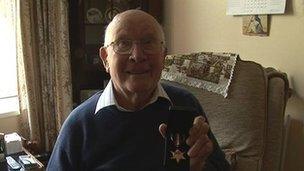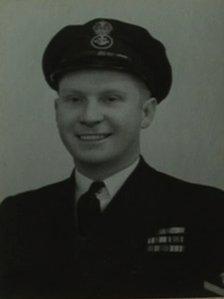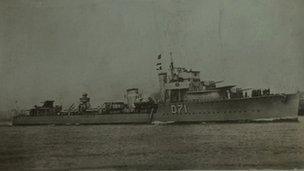Arctic convoys: John Cumming receives medal in the post
- Published

John Cumming received his Arctic Star medal in the post, more than 70 years after the icy voyages
A Northern Ireland veteran of the World War II Arctic convoys has finally been recognised for his service on one of the most dangerous missions of the war.
John Cummings from County Down, who is now 91, is the proud recipient of the the newly created Arctic Star medal.
The convoys brought crucial supplies and weapons to Russia, to help fight off Hitler's armies.
The icy voyages claimed over 3,000 lives and Winston Churchill described them as the worst journey in the world.
The supply ships were under constant threat of attack by German U-boats and aircraft and also had to negotiate severe cold, storms, and ice floes.
Long campaign
The voyages began in 1941 and by May 1945, the Arctic route had claimed 104 merchant ships and 16 military vessels.
The new military award was created after a long campaign by veterans of the convoys who lobbied the government for a specific medal to recognise the service of those involved in the mission.
At his home in Newtownards, Mr Cumming said: "I think of all the medals that we ever were awarded, I think we probably earned that particular one."
The County Down man joined the Navy in 1940, shortly after he turned 18.

John Cumming joined the Navy as a teenager, shortly after WWII broke out
The first vessel he served on board was the destroyer, HMS Volunteer, and he spent three years escorting naval convoys, many of which brought him to Russia.
"You had a lot of things to contend with apart from U-boats. The north Atlantic in the winter time - the storms there sometimes have to be experienced to be believed. Quite hairy, " he recalled.
Mr Cumming said the summer months offered little respite, because the Luftwaffe launched air attacks from German-occupied Norway.
Special ceremony
The pensioner said conditions on board were basic and there were times when they ran out of food and fuel.
"Some of the things that happened on some of those convoys - I saw some good ships coming down and blokes swimming in the water through thick oil fuels and so forth," he said.
"You're better to forget - better to try and forget."
Last month, 40 veterans involved in the recognition campaign were invited to a special ceremony in Downing Street where Prime Minister David Cameron presented them with their medals.
However, Mr Cumming received his Arctic Star in the post.
The County Down pensioner and his family were disappointed that he was not among the group invited to the presentation at Number 10.
A spokesperson for the Ministry of Defence said they wanted to accommodate as many veterans as possible but space was restricted.
'Outpost of empire'
They added invites were limited to those involved in the campaign for recognition.

The first ship the veteran served on was the destroyer, HMS Volunteer
Mr Cumming said he knew nothing of the ceremony until it was over and said that at times, Northern Ireland was treated almost "as an outpost of empire".
He added that while the medal was "better late than never", the 70-year wait for recognition had been too long for some of his County Down comrades.
A friend of his from Bangor, who had also served on the convoys, has since died.
He said another was living in a care home in Comber, but he supposed the gathering of military service documents required to apply for the Arctic Star would be "too much" for his ailing friend.
Mr Cumming has been back to Russia twice in the last 30 years - and despite not being invited to Downing Street, he said he was pleased that his service has finally been recognised.